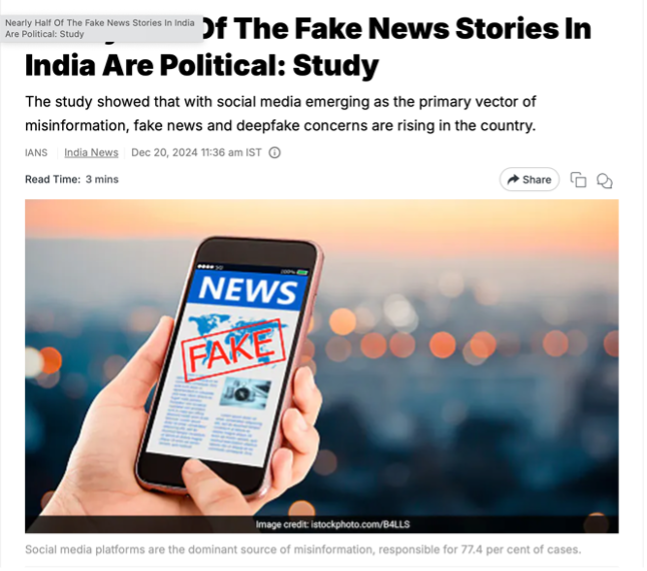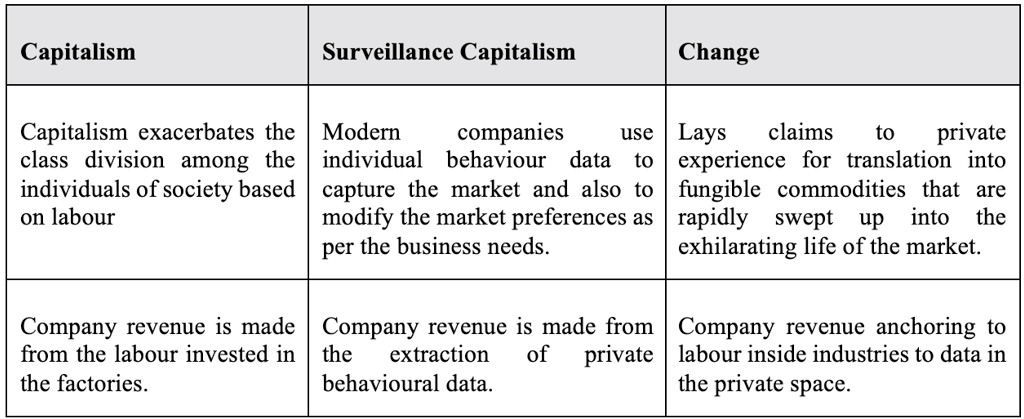Book: Surveillance Capitalism
Author: Sushona Zuboff
BOOK DISCUSSIONS
8/10/20254 min read


Table 1: Comparative Understanding of Karl Marx's Capitalism and Sushona Zuboff’s Surveillance Capitalism
Zuboff (2019, p. 8) defines surveillance capitalism as unilaterally claiming human experiences as free raw material, translating them into behavioural data. While some data improves products, the "behavioural surplus" is used to predict future actions. This raises questions about the nature of value exchange in the digital economy. Free services like Google Search and Amazon e-commerce track user behaviour, using this data to offer targeted services and goods. This model deviates from the traditional value-based exchange, resembling a form of extortion due to the unprecedented and untold usage of behavioural data.
The book argues that surveillance capitalism departs from industrial capitalism in crucial ways. The surveillance capacities of platform companies are designed to intrude on the private lives of the individual and to record and use such data for their benefit.
Behavioural data collection ->Analysis -> Behavioural anticipation -> Behavioural interception
It is interesting to look at the evolution of modernity and how such evolution has deep-rooted linkages with the untethering usage of digital services leaving a little concern towards the exploitation of behavioural data. This is explained through three phases of modernity in the book.
Why did I read this book?
The stories that you hear about the misinformation reveal a disturbing reality of unregulated internet usage impacting Indian society. The rampant spread of misinformation through images and videos on platforms like WhatsApp underscores the need for serious discussion and potential intervention at a national level. The challenge for individuals lies in discerning fact from fiction, leading to the formation of opinions based on potentially false information, often referred to as "filter bubbles" or "information silos." Research indicates a rise in confirmation bias, contributing to emotionally charged viewpoints, particularly regarding religion. This raises critical questions about mitigating the spread of misinformation and preventing the formation of baseless opinions, sparking global debate about internet regulation.
This concerning trend, coupled with the evident shift in power dynamics resulting from widespread digital device usage, prompted my search for literature explaining how business-oriented digital platforms shape society. Dystopian novels like George Orwell's 1984 illustrate the potential for intrusive government surveillance, mirroring, albeit on a smaller scale, the surveillance capacities observed in current internet and media content. This context led me to explore Shoshana Zuboff's Surveillance Capitalism.




Summary of the Book
Zuboff's book analyzes how platform companies gain surveillance power over individuals, dividing its exploration into three parts: the foundations, advancement, and instrumentation of this new form of capitalism. Crucially, it defines surveillance capitalism as the unilateral claiming of human experience as free raw material, translating it into behavioural data. This data is then used for profit, raising concerns about privacy and individual autonomy. It is important to note that this is different from what Karl Marx explained about capitalism.


Table 2: Understanding the Stages of Modernity in Case of India
Key Insights:
I. The Shift in User's Role and the Nature of Capitalism:
⒈ In surveillance capitalism, users become the means of revenue generation, a stark contrast to industrial capitalism where users were the end consumers driving profits. This signifies a fundamental shift in the relationship between businesses and individuals.
⒉ Surveillance capitalism, initially focused on targeted advertising, has expanded into personalized services, further blurring the lines between user experience and data exploitation.
II. The Evolution and Scope of Surveillance:
⒈ Companies have progressed from simply understanding behavioral data to actively modifying user behavior, raising ethical concerns about manipulation and autonomy.
⒉ Google's growth story serves as a prime example of how surveillance has become the core product, not a byproduct, of its business model.
⒊ Tacit knowledge, traditionally derived from human experience, is now anchored to online experiences, with platforms like Google controlling access and interpretation of this knowledge.
III. The Pervasiveness of Data Collection and its Implications:
⒈ Personalized service devices, such as Amazon's Alexa, collect personal behavioral data, feeding prediction engines to anticipate user needs. This exemplifies the integration of surveillance into seemingly innocuous everyday technologies.
⒉ Amazon's patents, including a "voice-sniffer algorithm," and its partnerships with car manufacturers demonstrate the increasing reach of data collection into various aspects of life.
⒊ An involuntary merger of personal necessity and economic extraction occurs as channels used for daily life (logistics, social interaction, work, etc.) simultaneously serve as supply chains for surveillance capitalism's data flows. This highlights the inherent difficulty in opting out of this system.
Points to Think About:
⒈ Are digital devices an added advantage to our life or an indistinguishable part of life?
This question probes the extent to which digital technologies have become integrated into our daily routines. Consider the various functions they serve: communication, information access, work, entertainment, and even necessities like banking and transportation. Reflect on the potential consequences of this dependence, both positive and negative, considering factors like access, digital literacy, and the potential for exclusion.
⒉ What would be the endpoint of ubiquitous surveillance? A new form of government?
This question explores the potential societal implications of widespread data collection and surveillance. Consider the potential for manipulation, control, and the erosion of privacy. Examine the parallels between Zuboff's concept of surveillance capitalism and historical examples of totalitarian regimes, considering the role of technology in shaping power dynamics. Reflect on the potential for new forms of governance or social control emerging from the dominance of data-driven systems.
⒊ Can we say no to extortionary terms and conditions? What is the exchange that we are making?
This question delves into the power imbalance between individuals and tech companies. Consider the often lengthy and complex terms and conditions that users must agree to to access digital services. Analyze the nature of the "exchange" taking place: users provide their data in exchange for access to services, often without fully understanding the implications of this trade-off. Reflect on the feasibility of opting out of this system, considering the pervasiveness of digital technologies in modern life. Explore potential alternatives or strategies for reclaiming control over personal data.
